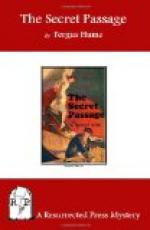The clock had just struck as Susan left the kitchen, and the three servants were bustling about so as to get to bed before their sharp-eyed old mistress found them. Susan went down the stairs. The door of the sitting-room was closed. She knocked but no voice told her to enter. Wondering if the bell had been rung by mistake, Susan knocked again, and again received no answer. She had a mind to retreat rather than face the anger of Miss Loach. But remembering that the bell had rung, she opened the door, determined to explain. Miss Loach was seated in her usual chair, but leaning back with a ghastly face. The glare of the electric lamp fixed in the ceiling, shone full on her white countenance, and also on something else. The bosom of her purple gown was disarranged, and the lace which adorned it was stained with blood. Startled by her looks Susan hurried forward and gazed searchingly into the face. There was no sign of recognition in the wide, staring eyes. Susan, quivering with dread, touched Miss Loach’s shoulder. Her touch upset the body and it rolled on the floor. The woman was dead. With a shriek Susan recoiled and fell on her knees. Her cry speedily brought the other servants.
“Look!” cried Susan pointing, “she is dead—murdered!”
Geraldine and Mrs. Pill shrieked with horror. Thomas preserved his stolid look of composure.
CHAPTER III
A MYSTERIOUS DEATH
To be the husband of a celebrated woman is not an unmixed blessing. Mr. Peter Octagon found it to be so, when he married Mrs. Saxon, the widow of an eminent Q.C. She was a fine Junoesque tragic woman, who modelled herself on the portraits of the late Mrs. Siddons. Peter, on the contrary, was a small, meek, light-haired, short-sighted man, who had never done anything in his unromantic life, save accumulate a fortune as a law-stationer. For many years he lived in single blessedness, but when he retired with an assured income of three thousand a year, he thought he would marry. He had no relatives, having been brought up in a Foundling Hospital, and consequently, found life rather lonely in his fine Kensington house. He really did not care about living in such a mansion, and had purchased the property as a speculation, intending to sell it at a profit. But having fallen in with Mrs. Saxon, then a hard-up widow, she not only induced him to marry her, but, when married, she insisted that the house should be retained, so that she could dispense hospitality to a literary circle.




